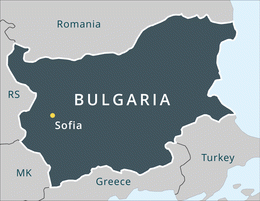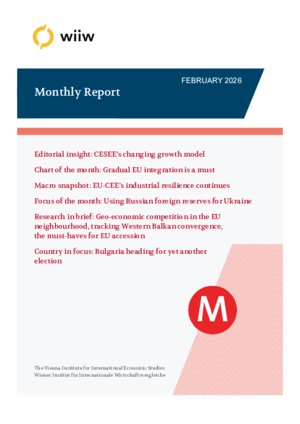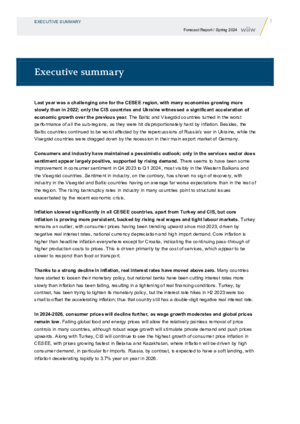Bulgaria

| FORECAST* | ||||||
|---|---|---|---|---|---|---|
| Main Economic Indicators | 2023 | 2024 | 2025 | 2026 | 2027 | 2028 |
| Population, 1000 persons | 6447 | 6441 | 6350 | . | . | . |
| GDP, real change in % | 1.7 | 3.4 | 3.1 | 2.7 | 2.6 | 2.6 |
| GDP per capita (EUR at PPP) | 24250 | 26320 | . | . | . | . |
| Gross industrial production, real change in % | -8.3 | -3.1 | -7.7 | . | . | . |
| Unemployment rate - LFS, in %, average | 4.3 | 4.2 | 3.5 | 3.6 | 3.7 | 3.7 |
| Average gross monthly wages, EUR | 1043 | 1189 | 1331 | . | . | . |
| Consumer prices, % p.a. | 8.6 | 2.6 | 3.5 | 3.3 | 3.2 | 3.0 |
| Fiscal balance in % of GDP | -2.0 | -3.1 | -3.0 | -3.1 | -4.2 | -3.0 |
| Public debt in % of GDP | 22.9 | 23.8 | 28.0 | . | . | . |
| Current account in % of GDP | -1.2 | -1.4 | -6.1 | -1.7 | -1.5 | -1.3 |
| FDI inflow, EUR m | 4792 | 3280 | 4310 | . | . | . |
| Gross external debt in % of GDP | 48.4 | 48.2 | 49.0 | . | . | . |
Basic data are continuously updated.
* Forecasts are changed beginning of January, April, July and November.
See Press Conferences.
Monthly Report No. 02/2026
Vasily Astrov, Alexandra Bykova, Rumen Dobrinsky, Richard Grieveson, Branimir Jovanović and Olga Pindyuk
wiiw Monthly Report No. 02, February 2026
35 pages including 7 Figures
Executive summary
Olga Pindyuk
in: The Crisis is Over, but its Scarring Effects are Hindering Recovery
wiiw Forecast Report No. Spring 2024, April 2024 , pp. I-VII
Details

